We're currently performing maintenance to enhance your experience. The site is still accessible, but some features may not be at their best. Thank you for your understanding!
1991
The Impetus for Working on Mental Health Issues
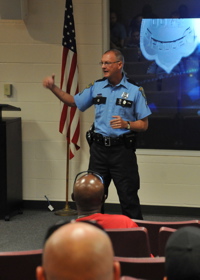
Officer Frank Webb, the person most responsible for the implementation of the Crisis Intervention Team (CIT) program in the Houston Police Department, initially worked to streamline the process of obtaining an Emergency Detention Order (EDO) in Houston/Harris County and increase capacity to evaluate the consumers brought in. The process was very complicated and time consuming. Officers had to complete a seven-page mental health packet, had to have it signed by a judge and notarized before the officer could take the mental health consumer to a facility for emergency evaluation. On average, the process took seven hours to complete. It was very frustrating for all concerned, kept the officers off of patrol for prolonged periods of time, and delayed treatment for the consumer in crisis. To add to the problem, the only facility available for indigent involuntary consumers was Ben Taub Hospital, with an in-patient capacity of 12 beds! The beds would quickly fill up resulting in officers having to stay with the consumer until a bed became available. This added several more hours to an already lengthy process.
1992
The Roots of Collaboration and CIT

Dr. Steven Schnee
In an effort to address the lengthy time it took to complete and emergency detention and the lack of psychiatric beds, Officer Webb met with Dr. Steven Schnee, the new executive director of the Mental Health Mental Retardation Authority (MHMRA) of Harris County (now called The Harris Center for Mental Health and IDD). From the start, Dr. Schnee was receptive to streamlining the process for completing an emergency detention and adding bed capacity. Dr. Schnee developed a schematic of a facility that would be able to handle the number of consumers brought in by police in a timely manner. This facility, the NeuroPsychiatric Center (NPC), was opened in 1999. This was the start of a very strong collaboration that exists today between the Houston Police Department and the mental health community in Houston/Harris County.
It took four years to streamline the process of completing an emergency detention. During this time, Officer Webb met with state legislators, probate judges, mental health professionals, mental health advocates, and other law enforcement personnel in an effort to learn about the Mental Health Code and the procedures for completing an emergency detention in other jurisdictions across the state and nation. Working on this issue was not part of Officer Webb’s routine duties. He worked on it in addition to his regular duties when he found time.
1993
First Class on Mental Illness Developed

It was obvious to Dr. Schnee and Officer Webb that there was a need to better educate officers about mental illness. Most officers had no training regarding the different mental disorders or the tactics and techniques that were proven to help de-escalate a situation involving an individual in a serious mental health crisis. Most officers had a very negative attitude about mental illness. One reason was the complicated and time consuming process of completing an emergency detention. A second reason was that most officers did not understand what was happening with an individual in a serious mental health crisis and did not feel confident when responding to these situations. A third reason most officers responded negatively to this issue was that many did not feel responding to individuals with mental illness was the role of law enforcement.
To address these concerns, Dr. Schnee assigned one of his psychologists to work with Officer Webb to develop a class on mental illness. An eight-hour elective in-service class titled “Dealing with the Mentally Ill” was developed in 1993. Staff from the Houston Police Department, The Harris Center for Mental Health and IDD, the Alliance on Mental Illness, and local mental health consumers assisted in the training. The class was taught from 1993 to 1996.
1995
Visit to Los Angeles Police Department’s Mental Evaluation Unit
Dr. Schnee sent Officer Webb and a social worker from The Harris Center for Mental Health and IDD to Los Angeles (CA) to study the police department’s Mental Evaluation Unit (MEU) and Systemwide Mental Assessment Response Team (SMART). Although it was decided these were not the types of programs for Houston, it started an examination of specialized programs for law enforcement response to the mentally ill. Upon returning from Los Angeles, Officer Webb received permission from Sam Nuchia, Chief of Police, to form a committee within the Houston Police Department to study specialized programs across the nation and the feasibility of piloting a program within the Houston Police Department. The committee was comprised of members of the Houston Police Department and The Harris Center for Mental Health and IDD and researched programs from Memphis (TN), Albuquerque (NM), and Los Angeles (CA).
The Process of Obtaining an Emergency Detention Order (EDO) Streamlined
The process for obtaining an EDO was significantly changed. Prior to 1995, officers had to complete a seven-page mental health packet and had to have it signed by a judge and notarized before the consumer could be brought to the facility for emergency psychiatric evaluation. In 1995, with the help of Dr. Schnee, the process was changed to the officer taking the consumer directly to the facility for evaluation and completing a three-page mental health packet at the facility. The officer waited until the packet was faxed to a judge, signed by the judge and faxed back.
1996
Mandatory 16-hour Class for all Patrol Sergeants

Chief Sam Nuchia
Officer Webb met with Chief of Police Sam Nuchia and his command staff in 1996 to recommend piloting a Mental Health Response Unit (what is today’s CIT). Chief Nuchia decided to start by mandating 16 hours of mental health training for all patrol sergeants. This training took place in 1997.
1998
Formation of Harris County Criminal Justice Workgroup

Betsy Schwartz
The Mental Health Association of Greater Houston (now Mental Health America of Greater Houston), under the direction of then Executive Director Betsy Schwartz, formed a multi-agency workgroup to look at the barriers to responding to the mentally ill in Harris County. Officer Webb was a member of the workgroup and explained his work to streamline the procedures for completing an emergency detention and to develop a program to respond to individuals in mental health crisis. The committee decided the primary issue to address was law enforcement’s response to individuals in serious mental health crises. The committee worked to develop a CIT program for the Houston Police Department.
1999
Opening of NeuroPsychiatric Center (NPC) and Further Streamlining of Procedures for Obtaining an EDO

The NeuroPsychiatric Center (NPC) opened in October 1999. The facility is a 24-hour, seven-days-a-week, 365-days-a-year operation. It is staffed with psychiatrists, nurses, social workers and psychiatric technicians. It has capacity for approximately 60 individuals in serious mental health crises. With the opening of the NPC, Dr. Schnee was able to further streamline the procedures for completing an emergency detention. Starting in 1999, officers take the consumer directly to the NPC, complete a one-page form, and return to duty! The officer no longer has to wait for the form to be faxed to a judge, signed and returned. The average time an officer spends at the NPC is 15 minutes.
Pilot CIT Program

The chief of the Houston Police Department, C. O. “Brad” Bradford, approved a request by Betsy Schwartz to pilot a CIT program. The proposal was to pilot a program, based on the Albuquerque (NM) Police Department, in one patrol division for one year. The pilot started in July 1999 in the Central Patrol Division with 63 officers trained.
2000
Department-wide Implementation
The pilot was so successful that, after six months, Chief Bradford ordered that the program be implemented in all patrol divisions. Department-wide expansion started in March of 2000. In June 2000, 213 patrol officers had received the training. By January 2001, approximately 700 officers (25% of patrol) received the training.
2001
Position of CIT Coordinator Approved

By January 2001, the Houston Police Department had the largest CIT program in the nation with over 700 CIT officers in 15 patrol divisions. The program was in need of a person to coordinate it. Chief C. O. Bradford approved of Officer Frank Webb taking that position. The CIT Coordinator’s position reported directly to the executive assistant chief over patrol operations. Officer Webb served in that capacity until August 2006 when the program got too big for Officer Webb to coordinate.
2005
State Mandated CIT Training
A very significant development directly related to Houston’s CIT program was the passage of Senate Bill 1473, The Bob Meadours Act. This bill mandated 16 hours of crisis intervention/de-escalation training for all Texas Peace Officers. Houston’s CIT training was used as the model for this curriculum.
Training for all Texas Police Chiefs

LEMIT Building at Sam Houston State University
Texas has over 1,200 police chiefs. All chiefs receive 40 hours of training every two years. This training, Texas Chief of Police Leadership Series, is provided by the Bill Blackwood Law Enforcement Management Institute of Texas (LEMIT) at Sam Houston State University. The state mandated 16-hour CIT training was part of the 2006-2007 training cycle. Because of the statewide leadership role of the Houston Police Department regarding CIT training, Officer Frank Webb was selected in 2005 to provide this training to the chiefs during the 2006-2007 training cycle.
2006
Formation of CIT Administrative Unit Formed

Chief of Police Harold L. Hurtt approved the formation of an administrative unit as the program got too large for Officer Webb to coordinate. Lieutenant Mike Lee was named unit manager. The other members of the unit were: Officers Frank Webb, Mark Carona, and Kristen McGray and Administrative Assistant Cindy Watson.
2007
Formation of Mental Health Unit

As the CIT Administrative Unit continued to expand, Chief Hurtt approved the formation of a Mental Health Unit within the Houston Police Department. This unit oversaw the departments multi-faceted, comprehensive program for responding to individuals in serious mental health crisis. The CIT program is the foundation of this strategy. Other programs under this unit included the following: training, media, investigations and a Crisis Intervention Response Team (CIRT) pilot. The CIRT pilot paired a uniformed CIT officer with a licensed mental health professional from The Harris Center for Mental Health and IDD. This team responds to CIT calls, responds to field officer’s requests for assistance with persons in apparent mental health crisis, returns patrol officers to patrol duties as quickly as possible when called for assistance, and conducts proactive and follow-up investigations on individuals who repeatedly require police intervention.
Responding to individuals in serious mental health crisis is becoming increasingly challenging for law enforcement agencies. The trend is to develop multiple strategies to address this complex and potentially volatile problem.
Cadets Receive 40-Hour CIT Class

Chief Harold L. Hurtt
Chief of Police Harold L. Hurtt made the decision to provide the 40-hour CIT class to all cadets. Training cadets as CIT officers is controversial among some in the CIT field.
One argument against training cadets as CIT officers is that the cadets should have one or two years of experience before being provided the training. Houston’s belief is that, as cadets learn to handle all other calls for service, e.g., homicide, suicide, forgery, burglary, accidents, etc., they are fully capable of grasping the concepts of crisis intervention/de-escalation.
A second argument against providing cadets CIT training is that they are not volunteers, that they may not have an interest in responding to mental health consumers. When the cadets graduate they have to handle many calls they do not have a personal interest in. Responding to individuals in serious mental health crises is part of policing in the 21st century and thus part of the job of a law enforcement officer today.
Our experience with cadets graduating the academy as CIT officers has been very positive. They have done an excellent job responding safely, professionally, and appropriately to individuals in serious mental health crises.
2008
Development of Crisis Intervention Response Team

Houston Police Department and Harris County Sheriff’s Office CIRT officers/deputies and their partner clinicians. (December 2012)
The Houston Police Department piloted a Crisis Intervention Response Team (CIRT) on May 5, 2008. This is a program that teams a Crisis Intervention Team (CIT) officer with a licensed mental health clinician from The Harris Center for Mental Health and IDD. The CIRT program augments the department’s Crisis Intervention Team (CIT) program. The following are the objectives of CIRT:
- Assist officers with CIT-related calls
- Conduct pro-active and follow-up CIT investigations
- Respond to all SWAT calls as a resource
- Handle the most serious CIT calls
The program has been an overwhelming success. As of October 2016, the Houston Police Department has 12 full-time CIRT units.
In October 2011, HPD collaborated with the Harris County Sheriff’s Office (HCSO) to start a CIRT program there. Their program has also been an overwhelming success, exceeding expectations. They started with three units. As of June 2014, the HCSO has nine units.
2009
Chronic Consumer Stabilization Initiative Pilot Program
As with criminal activity, a small percentage of individuals with mental illness account for the majority of police calls-for-service to individuals in serious mental health crisis. These are the individuals who continually go into crisis requiring repeated police intervention. Rather than continuing this reactionary cycle, the Chronic Consumer Stabilization Initiative (CCSI) takes a community policing, pro-active, collaborative approach to help keep these consumers from going into crisis, thus reducing police intervention.
The City of Houston Health Department provided initial funding to The Harris Center for Mental Health and IDD. With this funding, MHMRA hired two mental health case managers. The Houston Police Department’s Mental Health Unit identified the 30 mental health consumers the department responds to most frequently. Each clinician worked with 15 of these consumers with the goal of using all available resources to reduce subsequent crisis/calls-for-service.
These case managers access outpatient mental health treatment, housing, primary health care, substance abuse treatment, and social security benefits for the consumers assigned to them. The case managers work closely with the NeuroPsychiatric Center (NPC), Mobile Crisis Outreach Team, Crisis Stabilization Unit, Crisis Residential Unit, The Harris Center for Mental Health and IDD Helpline, and the Houston Police Department.
The program was piloted for six months in 2009. For the six months prior to the pilot, the 30 individuals identified by the MHU for placement in the program accounted for 396 police calls-for service, 183 emergency detention orders, and 213 offense reports. During the pilot, these same individuals accounted for 122 calls-for-service (69% change), 39 emergency detention orders (78% change), and 83 offense reports (61% change).
2010
Chronic Consumer Stabilization Program
The Chronic Consumer Stabilization Initiative pilot program was a resounding success and instituted as a permanent program in the department in 2010
Chronic Consumer Program Receives IACP Award
Houston’s Chronic Consumer Stabilization Program received the International Association of Chiefs of Police (IACP) 2010 Community Policing Award and was a Finalist for the 2010 Herman Goldstein Award for Excellence in Problem-Oriented Policing.
Houston Named National Learning Site
Houston was one of six police departments nationwide to be selected by the United States Council of State Governments as a learning site for specialized policing responses for resopnding to the mentally ill. As a learning site, Houston provides information on its multi-faceted strategies for responding to individuals in serious mental health crises, hosts visitors from across the nation, and trains law enforcement and mental health personnel from across the region, state and nation.

2011
Houston Leads Effort to Start State CIT Organization
Houston scheduled a meeting in Austin, Texas in November 2011 at the NAMI Texas conference. The purpose of the meeting was to discuss the development of a state CIT organization. Key CIT personnel from across the state , law enforcement and menal health, were invited. The following items were voted on:
- A goal to hold the first Texas CIT Conference during the NAMI Texas Conference the first weekend of November 2012 in Austin.
- To provide consistent, professional CIT training to the rural law enforcement agencies and correctional facilities across the state.
- The formation of the following committees: membership, technology, training and governance.
Development of Homeless Outreach Team

The Homeless Outreach Team (HOT) Started as a pilot program in January 2011. It was made a permanent program in the department after a very successful six-month pilot. Sergeant Stephen Wick, the team’s current supervisor, developed and implemented the program.
2012
Chronic Consumer Program Expands
Houston City Council, impressed with the program’s significant outcomes, voted to increase funding for the program. This increase in funding resulted in expanding the program from two case managers to four, and enabled the program to add a psychiatric technician.

Officer Mike Pate, of the Mental Health Unit, and the CCSI staff. (December 2012)
Mental Health Unit

Mental Health Unit – December 2012
The Houston Police Department’s Mental Health Unit (MHU) has grown into a significant unit. The unit oversees the following programs:
- Crisis Intervention Program
- Crisis Intervention Response Team
- Chronic Consumer Stabilization Initiative
- Council of State Governments Learning Site Program
In additon, members of the unit are involved in a program through the International Association of Chiefs of Police (IACP) to provide Alzheimer’s training to law enforcement agencies across the nation.
The MHU oversees the crisis intervention training of all personnel on the department and trains personnel from across the state and nation.
The success of the unit is attributed, in large part, to the collaboration that exists between the Houston Police Department and its mental health parnters in the community, state and nation.
Mental Health Unit Moves to Houston Center for Sobriety

Houston Center for Sobriety
The Mental Health Unit moved into the city’s first-ever Houston Center for Sobriety. The first floor of the facility is the Center for Sobriety; the second floor is the Houston Police Department Mental Health Unit. The Mental Health Unit spearheaded the Houston Police Department’s role in building the Center.
The Houston Center for Sobriety, aka Sobering Center, provides safe, short-term treatment and management of persons under the influence of alcohol and drugs. The Center provides those persons with information on and referrals to community-based outpatient services to help them not be caught in the “revolving door” of repeat offenders.
Mental Health Unit Recognized by Texas House of Representatives
Texas State Representative Armando Walle, District 140, wrote a resolution commending the Houston Police Department’s Mental Health Unit for its service to the community, mental health professionals, and the criminal justice system. The resolution also stated that Houston’s Mental Health Uhit exemplifies excellence and innovation through collaboration and commitment.
The resolution was read on the House floor on April 4, 2013.
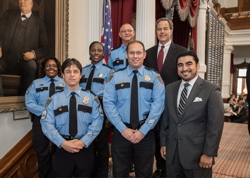
(front row left to right) Sergeant Patrick Plourde; Lieutenant Mike Lee, Manager of Houston’s Mental Health Unit; Texas State Representative Armando Walle.
(back row left to right) Officer Priscilla Rayon; Officer Janice Terry; Senior Officer Frank Webb; Joe Strauss, Speaker of the House, Texas House of Representatives
2013
Mental Health Unit Becomes a Division
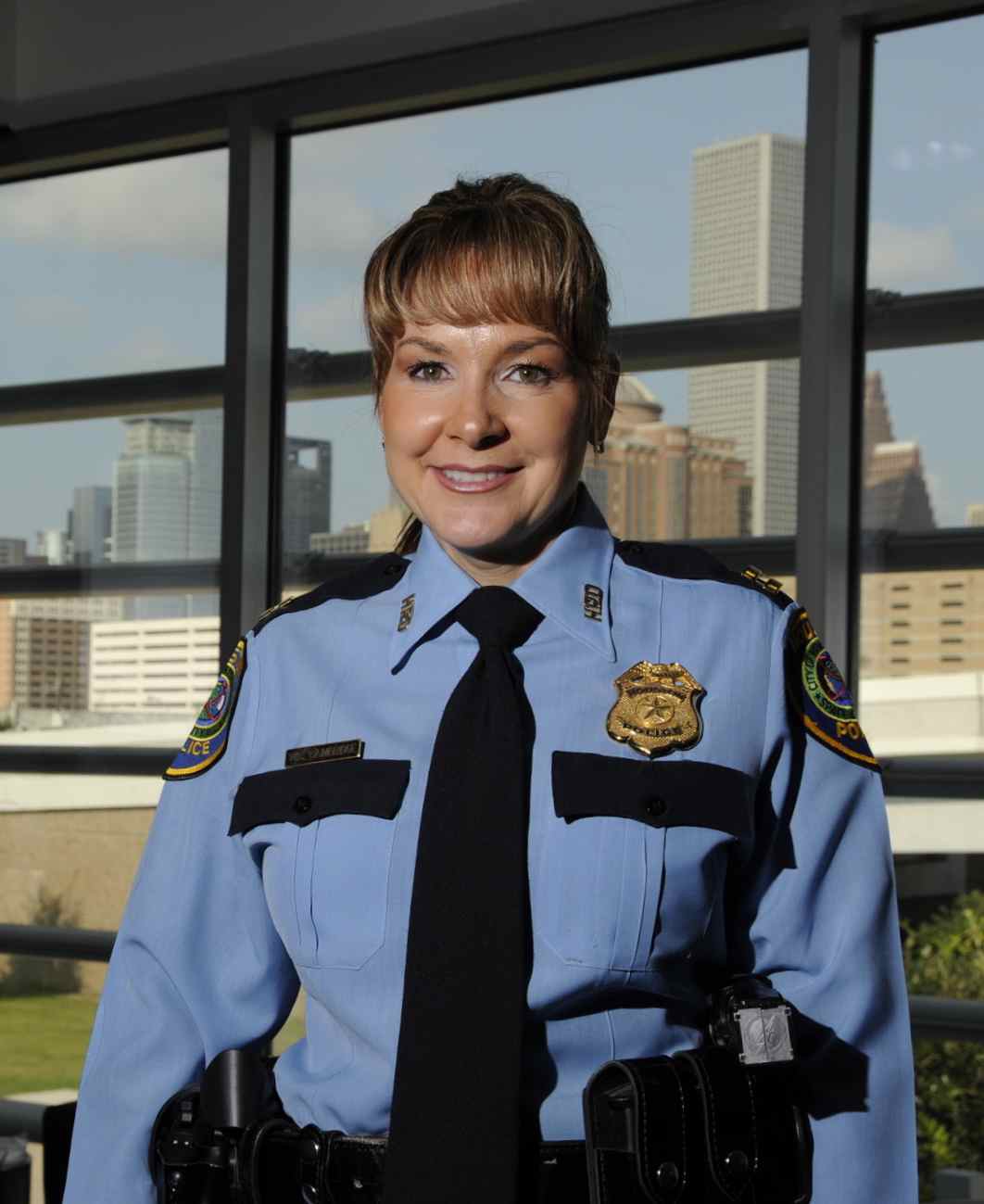
Captain Wendy Baimbridge
Chief of Police Charles A. McClelland, Jr. made the Mental Health Unit a division within the department. This is a significant development reflecting the impressive growth and importance of the unit. Becoming a division gives the unit permanence, officially placing it on the department’s organizational chart and puts a captain in charge. Captain Wendy Baimbridge became the first captain over the Mental Health Division in May 2013.
Peace Officer’s Notification of Detention Form
Lieutenant Mike Lee and Senior Officer Frank Webb worked with Travis County Probate Judge Guy Herman to draft legislation in the 83rd Texas Legislature to standardize the form Texas Peace Officers use to bring a person in serious mental health crisis for an emergency evaluation. The forms and procedures for bringing a person in on an emergency detention varies widely across the state. This is Lt. Lee’s and Officer Webb’s attempt to begin to standardize these forms and procedures. The bill, HB 1738, by Texas Representative Elliott Naishtat, was signed into law and signed by Governor Rick Perry with no opposition. The bill took effect September 1, 2013. The result is a one-page notification form that is to be used by all Texas Peace Officers.
Firearms Legislation
Lt. Mike Lee worked to get legislation passed that authorizes a peace officer who takes a person into custody for emergency mental health evaluation to immediately seize any firearm found in that person’s possession, after which the the officer must follow the requirements of Code of Criminal Procedure Art. 18.191 (Disposition of Firearm Seized From Certain Persons With Mental Illness.) The legislation, SB 1189, was signed by Governor Rick Perry and took effect September 1, 2013.
Chief McClelland Selects Mental Health Division for IACP Video
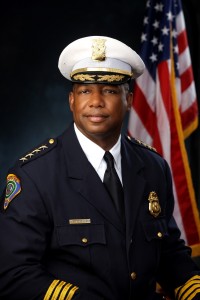
Charles A. McClelland, Chief of Police
Chief of Police Charles A. McClelland, Jr., was selected by the International Association of Chiefs of Police (IACP) to develop a video reflecting a division/program in the Houston Police Department to be shown at the IACP Conference in Philadelphia in October. Chief McClelland chose do make the video on the Mental Health Division. The video depicts the five progams of the Mental Health Division: Crisis Intervention Training Program, Crisis Intervention Response Team, Chronic Consumer Stabilization Initiative, Homeless Outreach Team, Council of State Governments Learning Site Program.
Crisis Intervention Response Team Citation
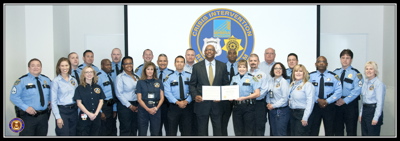
Chief of Police Charles A. McClelland, Jr., presented the officers, clinicians, and supervisors of the Crisis Intervention Response Team (CIRT) with a unit citation on October 9, 2013. CIRT is the department’s co-responder program partnering a Houston CIT Officer with a licensed professional counselor from the Mental Health Mental Retardation Authority of Harris County. Houston currently has 10 CIRT units.
Boarding Homes Enforcement Detail Implemented
Senior Officer Doug Anders worked for three years to develop and pass a city ordinance regulating un-licensed boarding homes in the City of Houston. Many of these boarding homes house individuals with mental illness. Although many are well run, many are not. The Boarding Homes Enforcement Detail works with several city and county agencies to help regulate these facilities to provide humane conditions for those living in them. The Boarding Homes Enforcement Detail was implemented November 2013.
Expansion of CCSI Program
The program was expanded with the addition of two case managers. The program now has one police officer and six case managers.
2014
Expansion of Homeless Outreach Team

The Homeless Outreach Team expanded by adding two officers and two case managers. They also added equipment: a new pickup truck and all-terrain vehicle with trailer. The team now has one sergeant, four officers, and three case managers.
Release of Homeless Outreach Team Video “The Shepherds in Blue”

The video is about Houston’s Homeless Outreach Team and can be viewed by accessing it through the “Video” tab on this website.
Expansion of Chronic Consumer Stabilization Initiative and Implementation of Violent Consumer Initiative
The Chronic Consumer Stabilization Initiative (CCSI) expanded from 50 consumers to 67 and from four case managers to six. Also, a Violent Consumer Initiative (VCI) was implemented within CCSI for those consumers who had one or more violent episodes involving the police or who made attempts or threats to carry out a mass shooting or who planned to harm another person.
2015
First Law Enforcement Field Operations Division in the Nation to Receive International Organization of Standardization Certification
Chronic Consumer Stabilization Initiative Wins the Prestigious Michael Shanahan Award for Successfully Collaborating with The Harris Center for Mental Health and IDD
The Homeless Outreach Team was a Finalist for the IACP 2015 Community Policing Award for Demonstrating Best Practices in Partnerships, Problem Solving, and Trust Building Within the Houston Community
The Crisis Intervention Response Team Expands by Two Teams
The Development of the Publication “Responding to the Mentally Ill: A Guide for Texas Peace Officers.”
The Tom and Carolyn Hamilton Foundation generously provided funding for printing of 5,000 of the Guides. The Guides have been distributed to all Texas police chiefs and to law enforcement personnel, behavioral health personnel, and family members across the state. Feedback had been received from many that the Guides have been a tremendous help to peace officers across the state.
2016
Implementation of the Crisis Call Diversion (CCD) Program
This innovative program brings helpline crisis counselors from The Harris Center for Mental Health into the Houston Emergency Center (HEC), Houston/Harris County’s dispatch center. A significant number of calls involving individuals in serious mental health crises have no criminal nexus. It is believed a significant percentage of these calls can be responded to by professional crisis counselors rather than dispatching a patrol or EMS units. The initial pilot program was implemented in March. Full implementation to include Houston Fire Department non-emergent mental health calls began December 15, 2017.
Growth of the Mental Health Division
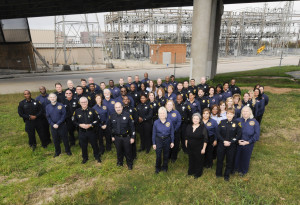
The Mental Health Division is comprised of 35 Houston Police Department personnel and 39 personnel from The Harris Center for Mental Health. The division oversees six programs for responding to the mentally ill with one program in development.
Crisis Intervention Response Team expanded to 12 teams
2017
Crisis Call Diversion Initiative now includes Houston Fire Department in addition to Houston Police Department Mental Health Calls.
Mental Health Division (MHD) used its crisis intervention trained personnel during Hurricane Harvey, to ensure the evacuation of the downtown homeless population and became the lead for law enforcement operations at the primary shelter located at the George R. Brown Convention Center, a 1 million square foot facility which served 10,300 evacuees without any serious incidents. MHD was awarded a Chief of Police Citation for its actions during this crisis.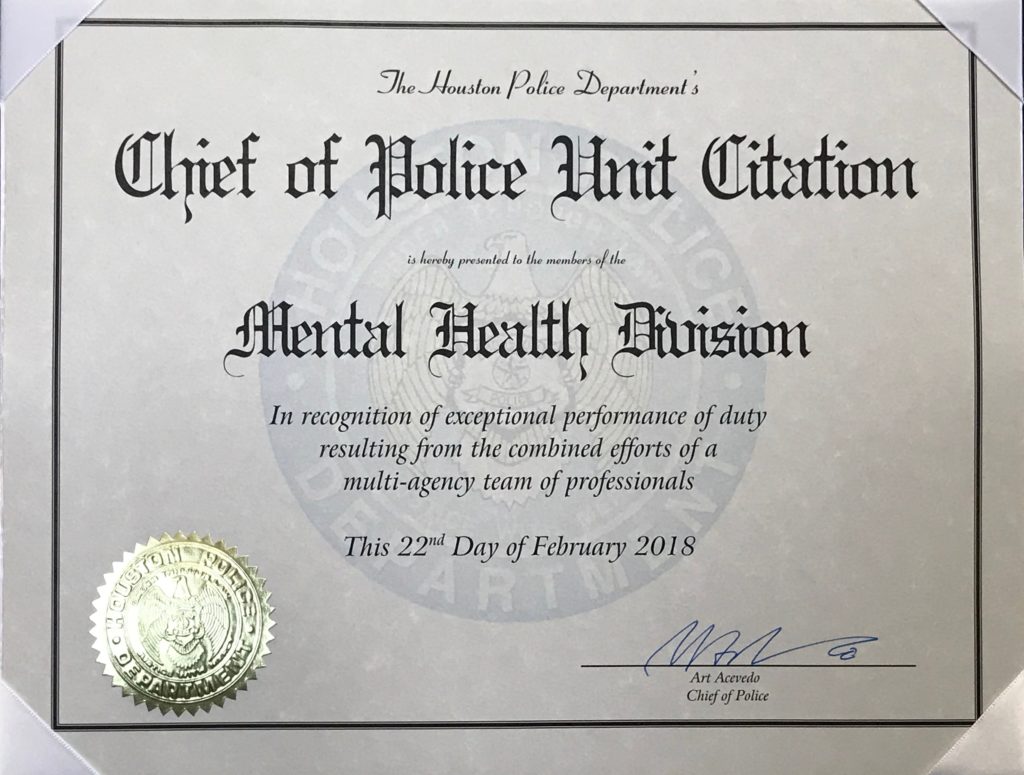
The Mental Health Division opens the Senior Justice Assessment Center.
